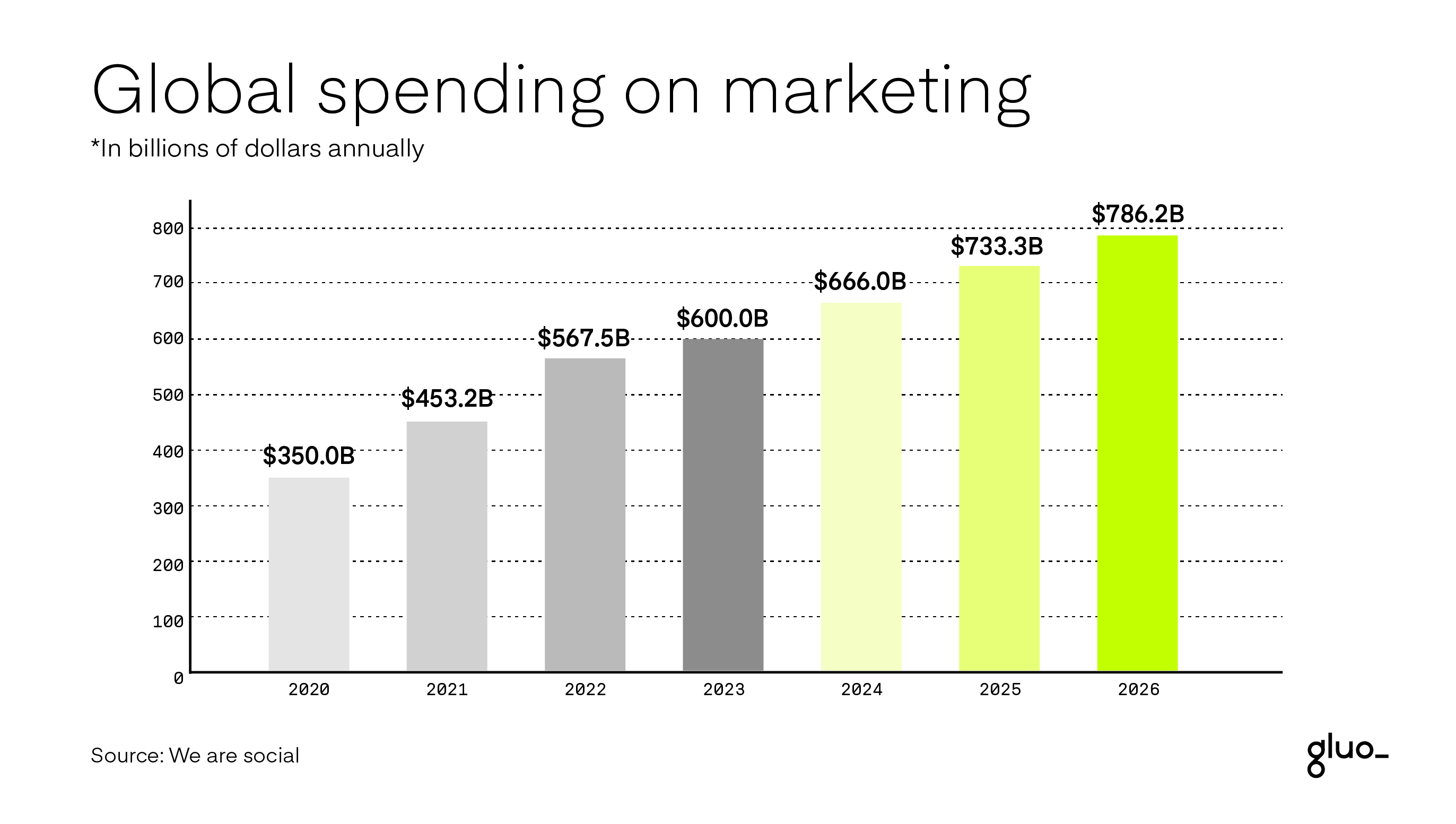International Marketing in eCommerce: What Is It and What Are the Best Strategies?

- What Is International Marketing in eCommerce
- The Importance of International Marketing in eCommerce
- 9 Advantages of International Marketing
- Challenges and Obstacles
- 6 Essential International Marketing Strategies for an eCommerce
- International Content Marketing
- International Social Media Marketing
- International Partnerships and Collaborations
- International Customer Retention
International marketing in eCommerce is based on sales strategies to market products or services outside a national audience through the internet, meaning it's an e-commerce that expands into foreign territories with the aim of increasing brand recognition, developing a global audience, and achieving sales growth.
International marketing refers to the application of marketing principles and practices in a global environment. It involves the planning, execution, and control of marketing activities that cross international borders to promote goods, services, or brands in different countries or regions.
It involves the combination of cultural adaptation, specific e-commerce strategies, and the ability to understand and adapt to the different market dynamics worldwide.
International marketing is essential for companies looking to expand their reach beyond national borders. It requires a deep understanding of cultural, economic, and social differences, as well as adaptability to meet the changing needs of global markets.
What Is International Marketing in eCommerce
International marketing for eCommerce refers to the application of digital marketing strategies to expand the presence and sales of an online business beyond national borders.
It includes aspects such as creating an online presence, implementing SEO strategies specific to each target market, selling through international marketplaces, enabling transactions in different currencies, and even managing shipping options, inventory, and coordination with local courier services.
It involves a combination of cultural adaptation, specific e-commerce strategies, and the ability to understand and adapt to the different market dynamics worldwide.
The Importance of International Marketing in eCommerce
The importance of international marketing in eCommerce lies in the ability to expand the reach of an online business beyond national borders, taking advantage of opportunities in international markets.
Most companies focus on marketing their products within their own country, unaware that the global market has a larger number of customers looking for their product, which means the global market is ready to welcome their products.
At the brand level, international marketing is a great opportunity for exposure, recognition, and sales increase. The opportunities at the international level are immense; you can reach large audiences, having implications on globalization and free trade.

9 Advantages of International Marketing
By internationalizing your eCommerce, you ensure reaching people from other countries, which means surpassing your brand's current limits. International marketing, besides supporting the economic diversification of your business, also helps your business reach a global audience, extending its reach to untapped areas.
The advantages of making good use of international marketing include:
Income Diversification: By entering international markets, eCommerce businesses can reduce their dependency on a single market and diversify their income sources.
Leveraging Global Trends: The ability to adapt and capitalize on global trends is essential. International marketing allows businesses to identify and engage in consumer trends that may vary across different parts of the world.
Global Competitiveness: Entering new international markets allows businesses to compete on a global level, leveraging their experience and competitive advantages.
Access to Customers with Specific Needs: Each international market may have unique needs and preferences. International marketing enables the adaptation of products and strategies to meet these specific needs, potentially leading to higher consumer acceptance.
Utilization of Global Technologies: eCommerce and digital technologies facilitate international expansion. E-commerce platforms, online payment methods, and global logistics services enable an efficient and effective presence in international markets.
Supply Chain Optimization: International expansion often involves optimizing the supply chain to ensure efficient and cost-effective deliveries worldwide. This can lead to improvements in logistics and inventory management.
Learning and Continuous Improvement: Entering new markets provides a valuable opportunity to learn about consumer dynamics and preferences in different regions. This feedback can be used to adjust strategies and continuously improve.
Business Resilience: Geographic diversification can make a business more resilient to economic fluctuations or crises in individual markets, as the company is not wholly dependent on the health of a single market.
Capitalizing on Emerging Economies: International marketing enables businesses to tap into opportunities in emerging economies that may be experiencing rapid growth and a rising middle class, offering new market opportunities.
International marketing in eCommerce is crucial for the growth and long-term sustainability of businesses that operate online. It allows businesses to reach new customers, adapt to different business environments, and seize the opportunities offered by global markets.
Challenges and Obstacles
One of the challenges of international marketing is understanding the approach to reach the international audience in terms of language, culture, or customs that are unknown to the company. If the goal is to expand into international markets, it is important to communicate correctly with the right messages, researching international marketing to develop specific strategies according to the new audiences your brand will target for successful inclusion.
Among the main challenges, we mention the following:
Different regulations and legislation in other countries can hinder some marketing actions for certain products or services.
Significant investment required for market research.
Distribution methods vary according to each country.
A significant barrier can be the translation and interpretation of language.
Addressing these challenges requires careful planning, thorough research, and a well-structured international marketing strategy. Currently, any company can reach international markets due to innovations in transportation, technologies, and digital tools.
6 Essential International Marketing Strategies for an eCommerce
International marketing in eCommerce involves applying digital marketing strategies and tactics to expand an online business's presence beyond national borders. You should consider the following:
1. Market Research
Market research is a fundamental part of the international expansion process in eCommerce and should include the study of economics, demographics, culture, regulations, and costs. The information gathered will help adapt marketing strategies to the specific needs of each market.
Market Analysis: Conduct thorough research on the target market in each country you are expanding to. Understand trends, consumer preferences, local competition, and trade regulations.
Cultural and Linguistic Adaptation: Adapt your content and marketing messages to cultural and linguistic differences. This includes language, tone, color, and cultural references on your website and campaigns.
2. Market Entry Strategy
The market entry strategy is crucial for a company's success in a new environment. Careful planning and adapting the strategy according to the specific conditions of each international market are essential.
Market Selection: Not all international markets are the same. Evaluate which have the greatest potential and which align best with your offering.
Distribution Channels: Decide whether to use local partners, sell directly through your website, or use international marketplaces.
3. International Website
Creating an effective international website involves a mix of cultural adaptation, technical optimization, and a deep understanding of local expectations and preferences. It's a continuous process that requires constant attention to ensure a positive experience for international users and the global success of your online business.
Website Localization: Ensure your website is easily understandable and accessible to users from different countries. Offer navigation, pricing, and payment options adapted to local preferences.
Currency and Pricing: Display prices in local currency and allow easy conversion between different currencies. Consider applying pricing strategies tailored to each market.
4. Marketing Strategies
International marketing involves adapting strategies to meet the needs of consumers in international markets. The key is a deep understanding of the particularities of each market.
International SEO: Optimize your website for local search engines. Use relevant keywords for each market and adapt your SEO strategy to the specificities of each region.
Global Advertising: Use digital advertising platforms to reach international audiences. Consider campaigns on Google Ads and other popular platforms in the target countries.
Social Media and Local Influencers: Engage on popular social media platforms in the target countries. Collaborate with local influencers to increase your brand's visibility.
5. International Customer Service
Customer service is a critical part of international marketing in eCommerce. Offering excellent customer service not only contributes to customer satisfaction but also builds brand reputation and can differentiate your company in global markets.
Multilingual Support: Provide customer support in multiple languages. This can include live chat, email support, and specific phone lines for each region.
International Shipping and Return Policies: Ensure your shipping and return policies are clear and adapted to local expectations.
6. Continuous Analysis and Adaptation
Data analysis in international marketing is a continuous process involving monitoring and adjusting strategies based on changes in global markets. A deep understanding of the specific metrics of each region will allow for effective optimization and informed decision-making.
International Analytics: Use web analytics tools to understand user behavior in different regions. Adjust your strategies based on results and market feedback.
Continuous Learning: Stay updated on market trends and international regulations. Learn from experience and constantly adapt your approach.
By implementing these strategies, you can leverage the potential of international marketing for your eCommerce and effectively expand your global presence.
International Content Marketing
International content marketing for eCommerce involves creating and distributing relevant and persuasive content to attract global audiences. The first step is to understand the buyer persona, regardless of their location.
It's not enough to implement an international strategy with a translation of unique content; this is where content localization comes into play, meaning adapting it to the needs of each country, so the user feels it has been created with them in mind.
Localization can involve text, design, and other aspects considered relevant. Being global means knowing how to adapt to the local needs of each country.
Create content relevant and adapted to different cultures: Understand cultural differences and adapt the tone, style, and content to resonate with each audience.
Content distribution in multiple languages: Translate content into different languages and ensure it is culturally relevant. You can also conduct in-depth research on specific keywords for each target market.
The key to success in international content marketing for eCommerce is continuous adaptation, a deep understanding of cultural particularities, and a quick response to global market trends. By implementing these strategies, you can create a significant and effective presence in international markets.
International Social Media Marketing
The use of social media in international marketing for an eCommerce is crucial for building a global presence, engaging with diverse audiences, and generating interest in products or services.
Social media acts as a lever to expand into a foreign market but is not the starting point for a company's internationalization.
Use of relevant global social media platforms: Identify the most popular and relevant social media platforms in each target market and create accounts dedicated to each significant market or region.
Adaptation of content and strategy for each market: Create messages tailored to each market; you can integrate local stories and examples to make the content more relevant.
Success on social media in other countries or regions hinges on continuous adaptation, cultural sensitivity, and the ability to respond to the trends and preferences of different markets.
International Partnerships and Collaborations
Entering a new market is easier if you have a partnership. Strategic alliances are commercial agreements with a common goal, benefiting all involved parties.
International partnerships and collaborations can be essential for expanding the presence of an eCommerce in global markets.
Identification of strategic partners and collaborators in different countries: Evaluate the competition and look for companies that already have an established presence in those markets. Use online platforms that connect international businesses in search of strategic partners and collaborators.
Creation of alliances to expand presence in international markets: Set up negotiation meetings to discuss the terms and conditions of the collaboration. Look for agreements that benefit both parties and are mutually profitable.
Creating effective international alliances requires a strategic approach, careful partner selection, and efficient collaboration management. By building strong and beneficial relationships, your eCommerce can capitalize on new market opportunities and strengthen its global presence.
International Customer Retention
The ability you have to retain your international customers can result in their loyalty towards your eCommerce, so it is essential to keep them satisfied by offering good service and quality of the product they have purchased.
For your customer retention to be effective:
Ensure that your product is of high quality and always in stock.
The price for the consumer should be attractive in each country where you promote it.
Customer service is a key point, both during the sales process and in after-sales, which makes your eCommerce more attractive.
Look for attractive designs for both your product and your online store, research the preferences of each region with the help of your store's localization.
Use loyalty strategies tailored to each market: Start by creating offers and promotions that take into account local events and festivities. You can also design loyalty programs that are adapted to the specific preferences and buying behaviors of each market.
Enhance the international customer experience in the purchasing process: Simplify the purchase process and the payment form to ensure a smooth experience. Remember to offer a variety of payment options that are popular and reliable in each region.
Retaining international customers requires a personalized approach and a deep understanding of the cultural and consumer behavior differences in each market. By implementing these strategies, you can strengthen the relationship with your global customers and foster long-term loyalty.


